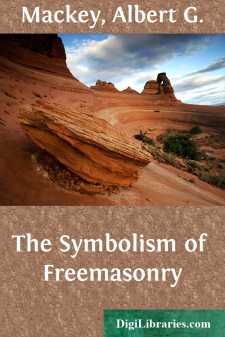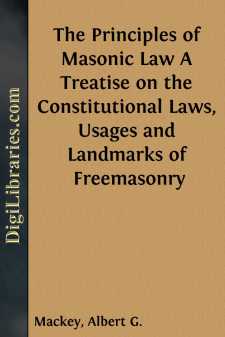Categories
- Antiques & Collectibles 13
- Architecture 36
- Art 48
- Bibles 22
- Biography & Autobiography 813
- Body, Mind & Spirit 142
- Business & Economics 28
- Children's Books 15
- Children's Fiction 12
- Computers 4
- Cooking 94
- Crafts & Hobbies 4
- Drama 346
- Education 46
- Family & Relationships 57
- Fiction 11828
- Games 19
- Gardening 17
- Health & Fitness 34
- History 1377
- House & Home 1
- Humor 147
- Juvenile Fiction 1873
- Juvenile Nonfiction 202
- Language Arts & Disciplines 88
- Law 16
- Literary Collections 686
- Literary Criticism 179
- Mathematics 13
- Medical 41
- Music 40
- Nature 179
- Non-Classifiable 1768
- Performing Arts 7
- Periodicals 1453
- Philosophy 64
- Photography 2
- Poetry 896
- Political Science 203
- Psychology 42
- Reference 154
- Religion 513
- Science 126
- Self-Help 84
- Social Science 81
- Sports & Recreation 34
- Study Aids 3
- Technology & Engineering 59
- Transportation 23
- Travel 463
- True Crime 29
The Symbolism of Freemasonry
by: Albert G. Mackey
Description:
Excerpt
I.
Preliminary.
The Origin and Progress of Freemasonry.
Any inquiry into the symbolism and philosophy of Freemasonry must necessarily be preceded by a brief investigation of the origin and history of the institution. Ancient and universal as it is, whence did it arise? What were the accidents connected with its birth? From what kindred or similar association did it spring? Or was it original and autochthonic, independent, in its inception, of any external influences, and unconnected with any other institution? These are questions which an intelligent investigator will be disposed to propound in the very commencement of the inquiry; and they are questions which must be distinctly answered before he can be expected to comprehend its true character as a symbolic institution. He must know something of its antecedents, before he can appreciate its character.
But he who expects to arrive at a satisfactory solution of this inquiry must first—as a preliminary absolutely necessary to success—release himself from the influence of an error into which novices in Masonic philosophy are too apt to fall. He must not confound the doctrine of Freemasonry with its outward and extrinsic form. He must not suppose that certain usages and ceremonies, which exist at this day, but which, even now, are subject to extensive variations in different countries, constitute the sum and substance of Freemasonry. "Prudent antiquity," says Lord Coke, "did for more solemnity and better memory and observation of that which is to be done, express substances under ceremonies." But it must be always remembered that the ceremony is not the substance. It is but the outer garment which covers and perhaps adorns it, as clothing does the human figure. But divest man of that outward apparel, and you still have the microcosm, the wondrous creation, with all his nerves, and bones, and muscles, and, above all, with his brain, and thoughts, and feelings. And so take from Masonry these external ceremonies, and you still have remaining its philosophy and science. These have, of course, always continued the same, while the ceremonies have varied in different ages, and still vary in different countries.
The definition of Freemasonry that it is "a science of morality, veiled in allegory, and illustrated by symbols," has been so often quoted, that, were it not for its beauty, it would become wearisome. But this definition contains the exact principle that has just been enunciated. Freemasonry is a science—a philosophy—a system of doctrines which is taught, in a manner peculiar to itself, by allegories and symbols. This is its internal character. Its ceremonies are external additions, which affect not its substance.
Now, when we are about to institute an inquiry into the origin of Freemasonry, it is of this peculiar system of philosophy that we are to inquire, and not of the ceremonies which have been foisted on it. If we pursue any other course we shall assuredly fall into error.
Thus, if we seek the origin and first beginning of the Masonic philosophy, we must go away back into the ages of remote antiquity, when we shall find this beginning in the bosom of kindred associations, where the same philosophy was maintained and taught....



